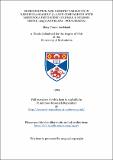Reproductive and genetic variation in 'Arenicola marina' (L.) and comparison with 'Arenicola defodiens' (Cadman & Nelson-Smith, 1993) (Annelida : Polychaeta)
Abstract
Populations of Arenicola marina from different localities have been reported to show variation in certain characteristics. There are morphological differences such as colour, size and annulation patterns, and there is also variation in the duration and timing of the spawning seasons on different beaches. An extensive study of gametogenesis in individuals from three selected study sites was carried out by regular sampling throughout the year. Each site shows a different spawning pattern, either epidemic such as at the East Sands, St. Andrews, or an extended season, such as at the Eden Estuary, St. Andrews. These two sites are less than three kilometres apart and yet there are significant differences in the size of the gravid adults. The third site, Fairlie Sands on the west coast of Scotland shows a very unusual type of spawning season in that a small percentage of the population are gravid throughout most of the year. Genetic variation was assessed using the technique of starch gel electrophoresis of allozymes. There is a degree of genetic differentiation between the three sites. Allele frequencies at the GOT locus are different between east and west coast sites and a third rare allele is present at Fairlie Sands. It is suggested that gene flow mediated by larval transport may be limited and this would cause inbreeding in some subpopulations. The hormones involved in spawning have been investigated with particular reference to a putative female oocyte maturation hormone. Comparative work between Arenicola marina and A. defodiens has demonstrated the presence of an oocyte maturation factor in the prostomia of both species. While this factor acts directly on A. defodiens oocytes in vitro, the presence of a cofactor or secondary product produced in vivo is required in order to reinitiate meiosis in A. marina oocytes. Preliminary studies on the nature of reproductive endocrine substances present in the prostomia of female A. marina have been carried out.
Type
Thesis, PhD Doctor of Philosophy
Collections
Items in the St Andrews Research Repository are protected by copyright, with all rights reserved, unless otherwise indicated.

